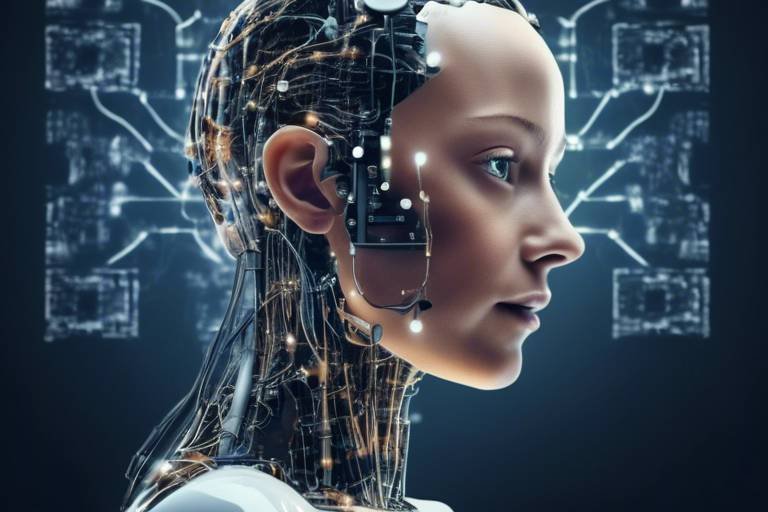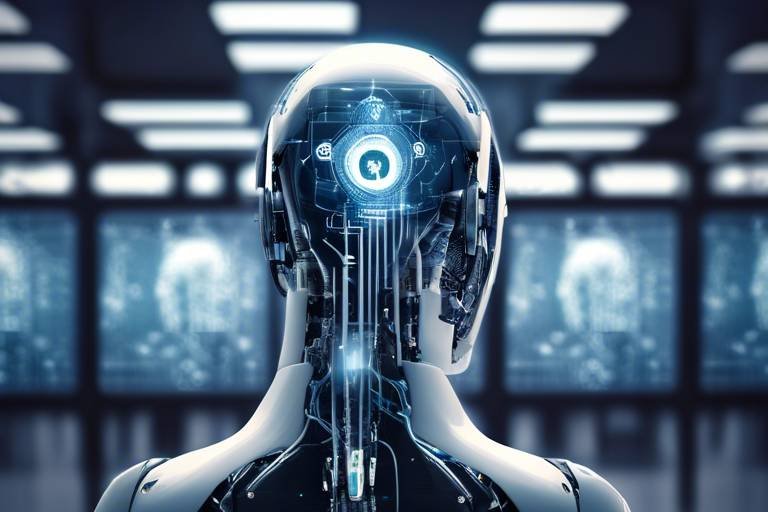AI in Application Development: What the Future Holds
In recent years, artificial intelligence (AI) has emerged as a game-changer in various industries, and application development is no exception. As we dive into the future of this field, it's essential to recognize that AI is not simply a tool; it’s becoming an integral part of how we design, build, and maintain applications. The transformative potential of AI lies in its ability to enhance productivity, streamline processes, and create more personalized user experiences. This article will explore the trends, benefits, challenges, and predictions that will shape the landscape of application development in the coming years.
Artificial intelligence is increasingly being integrated into application development, enhancing efficiency and innovation. But what is driving this trend? One major factor is the growing demand for faster and more efficient solutions. Businesses are under pressure to deliver applications that not only meet user expectations but also adapt to changing market conditions. Moreover, advancements in machine learning and natural language processing have made it easier for developers to implement AI functionalities into their applications. As a result, developers are finding themselves at the forefront of a revolution that promises to redefine their roles and the tools at their disposal.
So, what are the tangible benefits of incorporating AI into application development? The advantages are numerous and profound. For starters, AI can lead to improved accuracy in coding, which reduces the likelihood of bugs and errors. Imagine a world where developers can deploy applications faster than ever before, all while ensuring a high level of quality. This is not just a dream; it’s becoming a reality thanks to AI. Furthermore, the user experience is being transformed as AI enables applications to learn from user interactions and adapt accordingly, creating a more engaging and personalized environment.
One of the most significant impacts of AI is the enhancement of efficiency in the development process. AI tools can automate repetitive tasks such as code reviews, bug tracking, and even deployment processes. This automation allows developers to focus on more complex issues that require human creativity and problem-solving skills. For instance, instead of spending hours debugging code, developers can utilize AI-driven tools to identify issues quickly and accurately, freeing up their time for more strategic tasks. This shift not only boosts productivity but also fosters a culture of innovation.
Testing is a critical phase in application development, and AI can significantly improve this process. Traditional testing methods often involve manual checks and long cycles, which can delay deployment. However, AI can identify bugs and performance issues more effectively, allowing for quicker iterations. By analyzing vast amounts of data, AI can predict potential failures and suggest solutions before they become problematic. This proactive approach to quality assurance ensures that applications are robust and reliable upon release.
AI-powered code generation tools are revolutionizing how developers write code. These tools can suggest code snippets and solutions based on existing codebases, enhancing both productivity and creativity. Imagine having a virtual assistant that not only helps you write code but also learns from your coding style and preferences. This level of assistance can lead to faster development cycles and more innovative applications, as developers can experiment with new ideas without the fear of getting bogged down in syntax.
Another area where AI shines is in enhancing user experience. By leveraging data analysis and predictive analytics, AI can create personalized experiences tailored to individual users. This means applications can learn from user behavior and preferences, leading to more relevant content and features. For example, think about how streaming services recommend shows based on your viewing habits. Similarly, applications can adapt to user needs in real-time, creating a more engaging and satisfying experience.
Despite its many benefits, integrating AI into application development is not without challenges. Ethical considerations, data privacy, and technical limitations are just a few hurdles that developers must navigate. As we embrace AI, it’s crucial to address these issues head-on to ensure that the technology is used responsibly and effectively.
The use of AI raises important ethical questions, particularly concerning bias and transparency. Developers must be vigilant in creating algorithms that are fair and unbiased. Ethical AI practices are essential in fostering trust and ensuring that applications serve all users equitably. This means being transparent about how AI systems make decisions and continuously monitoring them for unintended consequences.
AI systems often rely on large datasets to function effectively, which raises concerns about user privacy. Developers must implement strategies to protect user data while still leveraging AI capabilities. This involves adopting robust security measures and being transparent with users about how their data is being used. Striking a balance between innovation and privacy is crucial for the long-term success of AI in application development.
Looking ahead, AI is poised to revolutionize application development even further. We can expect to see trends such as greater automation in coding, more sophisticated AI-driven analytics, and enhanced collaboration between human developers and AI systems. As these technologies evolve, they will not only change how applications are built but also how they function in the real world. The future is bright, and the possibilities are endless.
- What is the main benefit of using AI in application development?
AI enhances efficiency, reduces errors, and improves user experiences. - Are there any ethical concerns with AI in development?
Yes, issues like bias and transparency are significant ethical considerations. - How does AI improve user experience?
AI personalizes applications based on user data and behavior, making them more relevant and engaging. - What challenges do developers face when integrating AI?
Developers must navigate ethical considerations, data privacy, and technical limitations.

The Rise of AI in Development
Artificial intelligence is not just a buzzword anymore; it's rapidly becoming a cornerstone of application development. As technology evolves, developers and businesses are increasingly integrating AI into their workflows, leading to a significant transformation in how applications are built and maintained. This shift is fueled by several factors, including the need for greater efficiency, the demand for personalized user experiences, and the ever-growing complexity of software systems.
One of the primary drivers behind the rise of AI in development is the increasing volume of data that organizations collect. With the explosion of big data, developers are faced with the challenge of making sense of vast quantities of information. AI helps to analyze this data, uncovering patterns and insights that would be impossible to identify manually. As a result, developers can create applications that are not only responsive but also predictive, adapting to user needs in real-time.
Moreover, the competitive landscape in the tech industry pushes companies to innovate faster and more efficiently. AI technologies can automate repetitive tasks, such as code reviews and bug tracking, allowing developers to focus on more complex and creative aspects of application development. For instance, tools powered by AI can assist in identifying potential issues before they escalate, which leads to quicker resolutions and a more streamlined development process.
The implications of this trend are profound. Developers are no longer just coders; they are becoming strategic thinkers who leverage AI to enhance their capabilities. Businesses that adopt AI in their development processes are finding themselves at a significant advantage, as they can deliver products faster and with higher quality. This is not just about keeping up with the competition; it’s about setting new standards in the industry.
As AI continues to embed itself into the fabric of development, we can expect to see a shift in the skills required for developers. The future will likely demand a blend of traditional coding skills and a deep understanding of AI technologies. Developers will need to be proficient in using AI tools and frameworks, as these will become essential components of the development toolkit.
In summary, the rise of AI in application development is reshaping the industry in ways we are only beginning to understand. As we continue to explore the potential of AI, it’s clear that this technology will play a pivotal role in driving innovation and efficiency, making it an exciting time to be involved in the world of software development.

Benefits of AI-Driven Development
In today's fast-paced tech world, the integration of artificial intelligence (AI) into application development is not just a trend; it’s a revolution. The benefits of adopting AI-driven development are profound and multifaceted, transforming how applications are built, tested, and utilized. Imagine a world where applications are not only faster to deploy but also smarter in their operation. This is the reality that AI is crafting for developers and businesses alike.
One of the most significant advantages of AI in development is improved accuracy. With AI algorithms analyzing vast amounts of data, the potential for human error diminishes dramatically. For instance, AI can predict potential bugs before they become problems, allowing developers to focus on creating innovative features instead of troubleshooting issues. This leads to a more reliable product that users can trust.
Furthermore, the speed at which applications can be developed has increased exponentially. AI tools streamline the development process, enabling quicker iterations and faster deployment. Developers can leverage AI to automate mundane tasks such as code reviews and debugging, freeing up their time for more creative and complex challenges. This enhanced efficiency not only boosts productivity but also fosters a more dynamic development environment.
As we dive deeper into the benefits of AI, it’s essential to highlight how these tools automate repetitive tasks. Think of AI as a diligent assistant who tirelessly works behind the scenes, handling the grunt work while developers can engage in more critical thinking and problem-solving. For example, AI can manage version control and deployment processes, ensuring that the right code is always in the right place. This kind of automation is invaluable in a landscape where time is of the essence.
Another area where AI shines is in testing. Traditionally, testing phases can be tedious and time-consuming. However, with AI, the quality assurance process becomes significantly more efficient. AI systems can run extensive tests in a fraction of the time it would take a human, identifying bugs and performance issues with remarkable precision. This means applications are not only released faster but are also more robust and user-friendly.
Moreover, AI-powered code generation tools are changing the game for developers. These tools can suggest code snippets and solutions based on the context of the project, acting like a smart co-pilot. Imagine writing code with an intelligent assistant who understands your needs and helps you craft better solutions. This not only boosts productivity but also encourages creativity, allowing developers to explore new possibilities without getting bogged down by syntax errors or logic flaws.
AI also plays a crucial role in enhancing user experience. By analyzing user data and employing predictive analytics, applications can deliver highly personalized experiences. For example, AI can tailor content recommendations based on user behavior, making applications more engaging and relevant. This level of personalization is what users crave in a digital world overflowing with options. When applications understand their users, they foster loyalty and satisfaction, which are invaluable for any business.
In summary, the benefits of AI-driven development are clear and compelling. From improved accuracy and enhanced efficiency to a superior user experience, AI is reshaping the application development landscape. As we continue to embrace these technologies, the potential for innovation is limitless, paving the way for a future where applications are smarter, faster, and more intuitive than ever before.
- What are the primary benefits of AI in application development? AI enhances accuracy, speeds up deployment, and improves user experiences.
- How does AI improve testing processes? AI automates testing, identifies bugs more effectively, and ensures higher quality assurance.
- Can AI tools replace developers? While AI tools assist developers, they are designed to enhance human creativity and efficiency, not replace it.
- What ethical considerations should be taken into account with AI? Developers must ensure transparency and address potential biases in AI algorithms.

Enhanced Efficiency
In today's fast-paced digital landscape, developers are constantly seeking ways to enhance their productivity and streamline their workflows. Enter artificial intelligence (AI), a game-changer that is transforming the way applications are developed. By automating repetitive tasks, AI allows developers to shift their focus from mundane operations to more complex and creative challenges. Imagine a world where coding feels less like a chore and more like an art form; that's the promise of AI-driven development.
One of the most significant advantages of AI in application development is its ability to automate routine tasks. For instance, consider the time-consuming processes of debugging and testing. Traditionally, developers would spend countless hours sifting through lines of code to identify bugs. However, with AI tools, these tasks can be automated, significantly reducing the time and effort required. AI algorithms can analyze code patterns, recognize anomalies, and even suggest fixes, allowing developers to concentrate on refining features and enhancing user experience.
Furthermore, AI contributes to enhanced efficiency by providing intelligent systems that can learn and adapt over time. As these systems gather more data, they become better at predicting potential issues before they arise. This proactive approach not only saves time but also leads to a more polished final product. For example, AI can analyze historical data to forecast user behavior, enabling developers to anticipate needs and tailor applications accordingly. This level of foresight is akin to having a crystal ball for application development!
To illustrate the impact of AI on efficiency, consider the following table that compares traditional development methods with AI-enhanced approaches:
| Aspect | Traditional Development | AI-Enhanced Development |
|---|---|---|
| Time Spent on Repetitive Tasks | High | Low |
| Bug Detection | Manual, time-consuming | Automated, efficient |
| Predictive Analysis | Limited | Advanced, data-driven |
| Focus on Creative Solutions | Minimal | Maximized |
Moreover, the integration of AI tools can lead to a more collaborative environment among development teams. With AI handling the heavy lifting, team members can engage in more meaningful discussions and brainstorming sessions. This collaboration fosters creativity and innovation, paving the way for groundbreaking applications that resonate with users on a deeper level.
In conclusion, the enhanced efficiency brought about by AI in application development is not just a trend; it's a revolution. As developers embrace these intelligent systems, they unlock new levels of productivity and creativity. The future of app development looks promising, where the mundane is automated, and the extraordinary is created. So, are you ready to embrace the AI revolution in your development processes?
- What are the main benefits of using AI in application development? AI enhances efficiency, improves accuracy, and allows for more personalized user experiences.
- How does AI automate repetitive tasks? AI tools can perform tasks like bug detection and code generation, freeing developers to focus on more complex challenges.
- Are there any challenges associated with AI in development? Yes, challenges include ethical considerations, data privacy concerns, and potential technical limitations.
- Will AI replace developers in the future? While AI will automate certain tasks, it is more likely to assist developers, allowing them to focus on creativity and problem-solving.

Streamlined Testing Processes
In the realm of application development, testing is often seen as a necessary evil—a phase that developers must endure before their creation can finally see the light of day. However, with the advent of artificial intelligence, this perspective is rapidly changing. AI is revolutionizing testing processes, making them not just more efficient but also significantly more effective. Imagine being able to identify bugs and performance issues before they even become a problem. Sounds like magic, right? Well, it’s not; it’s the power of AI.
One of the primary ways AI streamlines testing is through automated testing frameworks. These frameworks utilize machine learning algorithms to analyze code and predict potential problem areas. By doing so, they can run tests more frequently and with greater accuracy than human testers ever could. This not only saves time but also reduces the likelihood of human error. Think of it like having a super-smart assistant that can sift through mountains of data and highlight the crucial parts for you—it's a game changer!
Additionally, AI can simulate user behavior more effectively than traditional methods. By leveraging predictive analytics, AI can anticipate how users might interact with an application, allowing developers to test various scenarios and edge cases that might not have been considered otherwise. This proactive approach is akin to having a crystal ball that shows you how your app will perform in the real world, helping you to iron out the kinks before launch.
Moreover, AI-driven testing tools can continuously learn from each test cycle. They adapt and improve over time, becoming more efficient and effective with each iteration. This self-learning capability means that not only are tests completed faster, but the quality of those tests also improves. Developers can spend less time on mundane testing tasks and focus more on creative problem-solving and innovation.
To illustrate the impact of AI on testing processes, consider the following table that summarizes traditional testing methods versus AI-enhanced testing:
| Aspect | Traditional Testing | AI-Enhanced Testing |
|---|---|---|
| Speed | Slower due to manual processes | Faster with automation |
| Accuracy | Prone to human error | Higher accuracy with predictive algorithms |
| Adaptability | Static, relies on predefined scenarios | Dynamic, learns from previous tests |
| Cost | Higher long-term costs due to inefficiencies | Reduced costs through efficiency and automation |
In conclusion, the integration of AI into testing processes is not just a trend; it's a fundamental shift that enhances the overall quality of applications. By automating repetitive tasks, simulating user behavior, and continuously learning from previous tests, AI helps developers create more robust, user-friendly applications. As we continue to embrace this technology, we can expect testing to become more streamlined, allowing developers to focus on what they do best: creating amazing applications that meet user needs.
- How does AI improve testing accuracy? AI algorithms analyze vast amounts of data to identify patterns and predict potential issues, reducing the chances of human error.
- Can AI replace human testers? While AI can automate many aspects of testing, human testers are still essential for creative problem-solving and understanding user experience.
- What types of applications benefit most from AI testing? AI testing is particularly beneficial for complex applications with frequent updates, such as web and mobile apps.

Code Generation and Assistance
In the fast-paced world of application development, AI-powered code generation tools are emerging as game-changers, offering developers a new level of assistance that was previously unimaginable. Imagine having a virtual co-pilot that not only understands your coding style but also anticipates your needs, suggesting snippets and solutions that speed up the development process. This isn't just a dream—it's a reality that many developers are already experiencing.
These tools leverage advanced algorithms and machine learning to analyze vast amounts of code from various sources, learning patterns and best practices along the way. As a result, they can generate code that is not only functional but also optimized for performance. This capability allows developers to focus on higher-level tasks, such as architecture and design, rather than getting bogged down in the minutiae of syntax and structure.
Moreover, the integration of AI in code generation can lead to significant productivity boosts. For instance, developers can save hours of manual coding by simply inputting a few parameters or requirements. The AI then produces the necessary code snippets, which can be easily integrated into existing projects. This not only accelerates development timelines but also fosters a more creative environment where developers can experiment with new ideas without the fear of time constraints.
However, it’s essential to note that while AI tools can enhance productivity, they are not a replacement for human developers. The creativity and critical thinking that developers bring to the table are irreplaceable. AI can assist in generating code, but it still requires a human touch to ensure that the final product aligns with user needs and business objectives. This partnership between man and machine is what will ultimately drive innovation in application development.
To illustrate the impact of AI on code generation, consider the following table that outlines some popular AI code generation tools currently available:
| Tool Name | Key Features | Use Cases |
|---|---|---|
| GitHub Copilot | Real-time code suggestions, context-aware completions | Web development, software engineering |
| Tabnine | AI-driven autocompletions, multi-language support | Full-stack development, mobile apps |
| Codeium | Code suggestions, integrations with popular IDEs | Rapid prototyping, debugging |
As we move forward, the role of AI in code generation and assistance will only grow stronger. Developers who embrace these tools will find themselves at the forefront of innovation, equipped with the ability to create applications faster and with greater precision than ever before. The future of coding is not just about writing lines of code; it's about collaborating with intelligent systems to bring ideas to life.
- What is AI-powered code generation? - It refers to tools that use artificial intelligence to help developers write code more efficiently by suggesting snippets and automating repetitive tasks.
- Can AI replace human developers? - No, AI tools are designed to assist developers, not replace them. The creativity and critical thinking of human developers remain essential.
- What are some popular AI code generation tools? - Some popular tools include GitHub Copilot, Tabnine, and Codeium, each offering unique features to enhance the coding experience.
- How does AI improve coding efficiency? - By automating repetitive tasks and providing context-aware suggestions, AI allows developers to focus on more complex and creative aspects of application development.

Improved User Experience
In today's fast-paced digital landscape, user experience (UX) has become a pivotal factor in the success of any application. With the integration of artificial intelligence, developers can now create more personalized and engaging experiences for users. Imagine walking into a store where every product is tailored to your tastes and preferences; this is what AI is doing for applications. By analyzing user behavior and preferences, AI can offer recommendations that feel almost intuitive, making the interaction seamless and enjoyable.
One of the core ways AI enhances user experience is through predictive analytics. By leveraging vast amounts of data, AI systems can anticipate user needs and suggest actions before the user even realizes they need them. For instance, if a user frequently orders coffee in the morning through an app, AI can prompt them with a reminder or a special offer, enhancing convenience and encouraging engagement. This level of personalization not only improves satisfaction but also fosters loyalty.
Furthermore, AI's ability to analyze data in real-time allows for dynamic content adaptation. This means that applications can adjust their interfaces and features based on user interactions. For example, if a user tends to engage more with video content, the application can prioritize video recommendations in their feed, creating a tailored experience that keeps them coming back for more. The result? A more engaging and relevant application that resonates with users on a personal level.
Moreover, AI-driven chatbots and virtual assistants are revolutionizing customer support. These intelligent systems can handle a multitude of queries simultaneously, providing instant responses that enhance user satisfaction. Imagine having a personal assistant available 24/7, ready to help with any issue or inquiry. This not only improves the overall experience but also allows human support teams to focus on more complex problems, ultimately leading to a more efficient resolution process.
However, it’s essential to strike a balance. While AI can significantly enhance user experience, developers must ensure that the technology is implemented ethically and transparently. Users should feel in control of their data and understand how it is being used to tailor their experiences. By prioritizing ethical AI practices, developers can build trust and foster a positive relationship with their users.
In conclusion, the integration of AI in application development is not just about making things faster or more efficient; it’s about creating a holistic user experience that feels personal and engaging. As we move forward, the focus will increasingly be on how well applications can adapt to individual user needs, making AI an indispensable tool in the quest for improved user satisfaction.
- How does AI improve user experience in applications?
AI enhances user experience by personalizing content, predicting user needs, and providing instant support through chatbots. - What are some examples of AI in user experience?
Examples include personalized recommendations, dynamic content adaptation, and AI-powered customer support. - Are there any ethical concerns with AI in applications?
Yes, ethical concerns include data privacy, bias in AI algorithms, and transparency in how user data is utilized.

Challenges in AI Integration
Despite the numerous advantages that artificial intelligence (AI) brings to application development, integrating AI into existing systems and processes is not without its challenges. These obstacles can range from technical limitations to ethical dilemmas, creating a complex landscape for developers and organizations. Understanding these challenges is crucial for anyone looking to harness the full potential of AI in their development projects.
One of the most pressing issues is ethical considerations. As AI systems are designed to learn from data, they can inadvertently inherit biases present in the datasets they are trained on. This can lead to skewed outcomes that may not only affect user experiences but also raise serious ethical questions about fairness and accountability. For example, if an AI application is biased against certain demographic groups, it can perpetuate stereotypes and create significant reputational damage for the companies involved. Therefore, it is essential for developers to implement rigorous testing and validation processes to identify and mitigate these biases.
Additionally, there are significant data privacy concerns associated with AI integration. AI systems often require vast amounts of data to function effectively, which can lead to apprehensions regarding user privacy. Organizations must navigate the delicate balance between leveraging data for improved application performance and ensuring that user information is protected. This is especially relevant in light of strict regulations such as the General Data Protection Regulation (GDPR) in Europe, which mandates stringent controls over personal data usage. Developers need to adopt strategies that prioritize data protection, such as anonymizing data sets and implementing robust encryption methods.
Moreover, the technical limitations of AI technologies can pose significant hurdles. Not all organizations have the resources or expertise to implement AI solutions effectively. From the need for specialized hardware to the complexities of machine learning algorithms, the technical barriers can deter many businesses from pursuing AI integration. Furthermore, the rapid pace of technological change means that developers must continually update their skills and knowledge to keep up with the latest advancements in AI. This creates an environment where ongoing education and training are essential for success.
To summarize, the challenges of integrating AI into application development are multifaceted and require careful consideration. Addressing ethical concerns, safeguarding data privacy, and overcoming technical limitations are all critical steps that developers must take to ensure the successful implementation of AI technologies. By doing so, organizations can harness the transformative power of AI while maintaining the trust and confidence of their users.
- What are the main challenges of integrating AI into application development?
The main challenges include ethical considerations, data privacy concerns, and technical limitations that can hinder effective implementation. - How can organizations address ethical concerns in AI?
Organizations can implement rigorous testing and validation processes to identify and mitigate biases in their AI systems. - What strategies can be used to protect user data while using AI?
Strategies such as anonymizing data sets and implementing robust encryption methods can help protect user data. - Why is continuous education important for AI developers?
Continuous education is essential due to the rapid pace of technological change in the AI field, requiring developers to stay updated on new advancements and best practices.

Ethical Considerations
As we dive deeper into the realm of artificial intelligence in application development, one cannot overlook the ethical considerations that accompany this technological evolution. The integration of AI raises significant questions about bias, transparency, and the overall impact on society. It's crucial for developers and businesses to navigate these waters carefully to ensure that the benefits of AI are realized without compromising ethical standards.
One of the primary concerns is the potential for bias in AI algorithms. These systems learn from vast datasets, and if those datasets contain biased information, the AI can inadvertently perpetuate and even amplify those biases. For instance, if an AI model is trained on historical hiring data that reflects gender or racial biases, it may favor candidates from those backgrounds, leading to unfair hiring practices. This scenario raises the question: how can developers ensure that their AI systems are fair and unbiased?
To address this, developers must implement rigorous testing and validation processes. This involves:
- Regularly auditing datasets for bias
- Using diverse datasets to train AI models
- Incorporating feedback loops to continually improve AI performance
Another ethical consideration is transparency. Users have a right to understand how AI systems make decisions, especially when those decisions significantly impact their lives. For example, if an AI system determines a user's creditworthiness, it should be clear how that decision was reached. This transparency builds trust and allows users to challenge or question decisions they perceive as unfair.
Moreover, the ethical use of AI also encompasses the aspect of accountability. When an AI system makes a mistake, who is responsible? Is it the developer, the company, or the AI itself? This ambiguity can create legal and moral dilemmas. Establishing clear guidelines and accountability measures is essential for fostering a responsible AI environment.
Lastly, as AI continues to evolve, developers must remain vigilant about the impact of AI on jobs and employment. While AI can automate many tasks, it also raises concerns about job displacement. Companies should strive to balance efficiency with the human element, ensuring that AI enhances rather than replaces human jobs. This might involve reskilling employees to work alongside AI systems, transforming potential threats into opportunities for growth.
In summary, while AI offers incredible potential for innovation in application development, it also comes with a set of ethical considerations that must be addressed. By prioritizing bias mitigation, transparency, accountability, and the human workforce, developers can harness the power of AI responsibly and ethically.
- What are the main ethical concerns regarding AI in application development?
The main concerns include bias in algorithms, transparency in decision-making, accountability for AI actions, and the impact on employment. - How can developers mitigate bias in AI systems?
Developers can mitigate bias by auditing datasets, using diverse training data, and incorporating feedback loops for continual improvement. - Why is transparency important in AI?
Transparency is crucial because it helps users understand how decisions are made, builds trust, and allows for accountability. - What role does accountability play in AI ethics?
Accountability ensures that there is a clear understanding of who is responsible for AI decisions, which is vital for addressing mistakes and ethical breaches.

Data Privacy Concerns
In today's digital landscape, where artificial intelligence plays a pivotal role in application development, data privacy concerns have emerged as a significant challenge. As developers harness the power of AI, they often rely on vast amounts of data to train their algorithms. However, this reliance raises critical questions about how user data is collected, stored, and utilized. Are we sacrificing user privacy in the name of innovation? This is a question that developers and businesses must grapple with as they integrate AI into their applications.
One of the primary issues is the potential for data breaches. With AI systems processing sensitive information, the risk of unauthorized access increases. Imagine a scenario where a hacker exploits a vulnerability in an AI-driven application, gaining access to personal data such as financial information or health records. The implications of such breaches can be devastating, not only for users but also for the businesses involved, leading to loss of trust and significant financial repercussions.
Moreover, the nature of AI often involves the use of machine learning models that require large datasets for training. These datasets can sometimes include personally identifiable information (PII), which, if not handled correctly, can lead to privacy violations. It's crucial for developers to implement robust data anonymization techniques to ensure that individual identities cannot be traced back from the datasets used in AI training. This is where ethical AI practices come into play, emphasizing the need for transparency in how data is used.
To address these concerns, organizations can adopt several strategies:
- Data Encryption: Encrypting sensitive data both in transit and at rest can provide an additional layer of security against unauthorized access.
- Regular Audits: Conducting regular security audits and assessments can help identify vulnerabilities within AI systems and ensure compliance with data protection regulations.
- User Consent: Obtaining explicit consent from users before collecting their data is essential. This not only builds trust but also aligns with regulations like GDPR.
Ultimately, the challenge of data privacy in AI-driven application development is not insurmountable. By prioritizing ethical practices, implementing stringent security measures, and fostering a culture of transparency, developers can leverage the power of AI while safeguarding user privacy. As we move forward, the conversation around data privacy will only intensify, making it imperative for businesses to stay ahead of the curve and prioritize the protection of their users' data.
Q1: What are the main concerns regarding data privacy in AI?
A1: The main concerns include the risk of data breaches, the use of personally identifiable information (PII) in training datasets, and the need for transparency in data usage.
Q2: How can businesses ensure data privacy while using AI?
A2: Businesses can ensure data privacy by implementing data encryption, conducting regular audits, and obtaining user consent before data collection.
Q3: What role does user consent play in data privacy?
A3: User consent is crucial as it builds trust and ensures compliance with data protection regulations, allowing users to have control over their personal information.

The Future of AI in Application Development
As we look to the horizon, it's clear that artificial intelligence is set to revolutionize application development in ways we can only begin to imagine. With advancements in machine learning, natural language processing, and data analytics, the future is brimming with possibilities that promise to enhance not only how applications are built but also how they function and interact with users. Imagine a world where applications can learn and adapt in real-time, providing a level of personalization and efficiency that was previously thought to be the stuff of science fiction.
One of the most exciting prospects is the rise of autonomous development environments. These environments will leverage AI to automate the entire development cycle—from coding and testing to deployment and maintenance. Developers will find themselves in a collaborative partnership with intelligent systems that can predict needs, suggest improvements, and even write code snippets based on high-level instructions. This shift will not only speed up the development process but also allow developers to focus on more strategic and creative tasks.
Furthermore, we can expect to see AI-driven applications become increasingly context-aware. By analyzing user behavior and preferences, these applications will be able to provide tailored experiences that resonate on a personal level. For instance, imagine an application that adjusts its interface and functionality based on your usage patterns, making it more intuitive and user-friendly. The potential for enhanced user engagement and satisfaction is immense.
However, with these advancements come new challenges that developers and businesses must navigate. Issues such as data privacy and ethical considerations will become even more pressing. As applications gather and analyze vast amounts of user data, ensuring the protection of this information while maintaining transparency will be crucial. Developers will need to implement robust data governance frameworks and prioritize ethical AI practices to build trust with users.
Looking ahead, we can also anticipate a greater emphasis on collaborative AI. This concept involves AI systems working alongside human developers to enhance creativity and problem-solving capabilities. By combining human intuition with machine intelligence, we can unlock new levels of innovation and efficiency in application development. For example, AI could analyze historical project data to suggest best practices and potential pitfalls, helping teams to avoid common mistakes.
In summary, the future of AI in application development is not just about automation; it's about creating a synergistic relationship between human creativity and machine intelligence. As we embrace these changes, we must also remain vigilant about the ethical implications and ensure that our advancements serve to enhance the user experience rather than compromise it. The road ahead is filled with opportunities, and it's up to us to navigate it wisely.
- What role will AI play in application development in the next few years?
AI will likely automate many aspects of the development process, making it faster and more efficient while also enhancing user experiences through personalization. - How can developers prepare for the future of AI in their work?
Developers should focus on learning about AI technologies, data privacy, and ethical considerations to stay ahead in the evolving landscape. - What are the potential risks associated with AI in application development?
Risks include data privacy concerns, ethical dilemmas, and the possibility of over-reliance on AI systems, which could stifle human creativity.
Frequently Asked Questions
- What is the role of AI in application development?
AI plays a crucial role in application development by automating repetitive tasks, enhancing efficiency, and improving user experiences. It allows developers to focus on more complex issues while AI handles mundane tasks, leading to faster and more accurate development processes.
- How does AI improve the efficiency of developers?
AI improves efficiency by automating routine tasks such as code testing and debugging. This means developers can spend less time on repetitive work and more time on innovative solutions, ultimately speeding up the development cycle.
- What are the benefits of using AI-driven development tools?
AI-driven development tools offer numerous benefits, including enhanced accuracy in coding, faster deployment times, and more personalized user experiences. These tools can suggest code snippets and solutions, helping developers to be more productive and creative.
- What challenges might developers face when integrating AI?
While integrating AI can bring many advantages, developers may encounter challenges such as ethical concerns, data privacy issues, and technical limitations. Addressing these challenges is crucial to ensuring responsible and effective use of AI in application development.
- How can ethical considerations affect AI in development?
Ethical considerations in AI development include issues related to bias and transparency. It's essential for developers to implement ethical AI practices to avoid perpetuating biases in applications and to ensure that their AI systems are transparent and accountable.
- What measures can be taken to protect user data in AI applications?
To protect user data, developers can adopt strategies such as data anonymization, implementing robust security measures, and ensuring compliance with data protection regulations. This helps mitigate privacy concerns while still leveraging the capabilities of AI.
- What does the future hold for AI in application development?
The future of AI in application development looks promising, with predictions of even more advanced tools and technologies that will further streamline processes, enhance user experiences, and drive innovation across the industry. Developers can expect continuous evolution in AI capabilities that will reshape the landscape of application development.



















